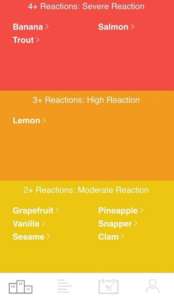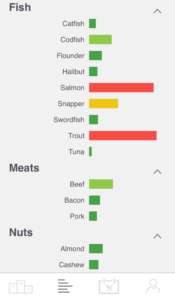By Christy Strouse
Previously I wrote about my first-hand experience with the FIT test by KBMO diagnostics. (see article here). In this article, I’ll break down my test results and explain what the results can and cannot reveal. Finally, I’ll share my personal experience and thoughts on how the test might provide valuable information.
The short and sweet is that I had a “severe” immune reaction to salmon, trout, and banana. I had a “moderate” and “high” reaction to lemon, pineapple, grapefruit, vanilla, snapper, clam and sesame. I’m not at all sad about giving up clam or snapper, but slightly inconvenienced by my reaction to salmon and trout since these are my go-to lean proteins.

 As I mentioned in my previous article, the KBMO FIT test not only measures the IgG response to a food, but also the immune complex C3D. In this way, it identifies foods to which the body mounts an immune response. It is recommended to avoid these foods for a period of time, lasting anywhere from a few weeks to a few months. Our current evidence suggests that some foods provoking a 4+ reaction may eventually be rotated back in, but they should not be eaten every day. The FIT test certainly provides helpful information, but I remain convinced that test results are only relevant within the context of a doctor-patient relationship. After all, healing is not a matter of having more information, but rather it occurs when the physician and patient work as a team, making sense of the test results together. I have found that the best physicians don’t rely only on test results, but rely heavily on clinical judgement and expertise. Testing allows the doctor to dig below the surface to get a better look. We’d all like to think that medicine provides clear answers, but often in the case of complex, chronic conditions such as Irritable Bowel Syndrome (IBS) or Inflammatory Bowel Disease (IBD), causes are multifactorial, requiring a multi-faceted treatment approach.
As I mentioned in my previous article, the KBMO FIT test not only measures the IgG response to a food, but also the immune complex C3D. In this way, it identifies foods to which the body mounts an immune response. It is recommended to avoid these foods for a period of time, lasting anywhere from a few weeks to a few months. Our current evidence suggests that some foods provoking a 4+ reaction may eventually be rotated back in, but they should not be eaten every day. The FIT test certainly provides helpful information, but I remain convinced that test results are only relevant within the context of a doctor-patient relationship. After all, healing is not a matter of having more information, but rather it occurs when the physician and patient work as a team, making sense of the test results together. I have found that the best physicians don’t rely only on test results, but rely heavily on clinical judgement and expertise. Testing allows the doctor to dig below the surface to get a better look. We’d all like to think that medicine provides clear answers, but often in the case of complex, chronic conditions such as Irritable Bowel Syndrome (IBS) or Inflammatory Bowel Disease (IBD), causes are multifactorial, requiring a multi-faceted treatment approach.
In terms of using food sensitivity testing with the goal of curing digestive ailments, it’s important to understand that there are many other factors that can contribute to symptoms. In my case, I was told it was due to the presence of endometriosis (confirmed by laparoscopy), GERD, possible early IBD, and even stress. At one point, my family doctor even said that I ate too healthy!
Food sensitivity testing through the FIT test provides reliable data, however it cannot rule out causes that are mechanical in nature. For this reason, GI doctors often rely on endoscopies, colonoscopies and other more invasive procedures in order to assess the structure and function of the digestive system. I would conclude that the FIT test could be ordered in conjunction with other medical tests, as determined by your healthcare team.

After reviewing the test results with my physician, I was surprised (and very pleased) to learn that her goal was to help to liberalize my diet. She made it clear from the start that food sensitivity testing can be helpful, but it should not work to create food phobias and disordered eating. Individuals who struggle with digestive issues often feel confused and afraid of foods. The dis-ease of having symptoms such as diarrhea, bloating, gas—not to mention joint and skin manifestations, leads to fear around eating. At some point, all food is considered suspect for provoking a flare. One pleasant outcome of the FIT test results is that some of the once “forbidden” foods were now added back into the “likely safe” category for me.
It appeared that I did not have an immune response to dairy and grains, although this does not test for conditions such as lactose intolerance or celiac disease. For some people it can confirm their own intuitions about foods and food groups which is a much-needed confidence booster. In many circles, gluten and dairy are considered some of the highest evils, and in fact can be responsible for symptoms in many individuals, but it’s important to know that not everyone needs to avoid organic grains and dairy. Guessing can lead to erroneous conclusions whereas testing can settle the question, can I eat this?
If you would like to know more about food sensitivity testing, please contact us here and one of our team members will get back with you.
Christy is a Registered Dietitian Nutritionist & Certified Personal Trainer with OptimalSelf MD in Greenville, SC.
